|
Muppets Holding Company
by Wikipedia

The Muppets Holding Company, LLC is a
wholly-owned subsidiary of media conglomerate The Walt Disney Company,
formed in 2004 through the acquiring of The Muppets and Bear in the Big
Blue House characters from The Jim Henson Company.
Since the mid-1980s, Jim Henson had
been in talks with Disney CEO Michael Eisner to sell Disney the Muppets.
He and other Muppet performers had secretly filmed tutorials for Disney
animators, entertainers and Imagineers on the matter of how to properly
operate a Muppet, and many Muppet producers were already preparing for
the transfer. On August 28, 1989, the two announced a deal for Disney to
buy Henson Associates and all of its characters, excluding those
featured on "Sesame Street." The deal fell through several months after
Jim Henson's untimely death in 1990, largely due to clashes between the
Henson family and Disney attorneys. Following several legal battles, the
theme park attraction, Jim Henson's MuppetVision 3D, opened at the
Disney-MGM Studios in May 1991.
Disney CEO Michael Eisner remained
interested in Henson for many years. It was only until 2003 that
negotiations were finally re-opened after the Henson family bought The
Jim Henson Company back from EM.TV, to whom they had sold the company in
2000. Michael Eisner officially announced the purchase of the Muppets
characters from The Jim Henson Co. in February 2004, and the first
Muppets movie under complete Disney control (several Muppets movies had
been made before with the help of Walt Disney Pictures), The Muppets'
Wizard of Oz, went into production immediately and aired on ABC in May
2005.
When Eisner stepped down and new Disney
CEO Robert Iger succeeded him, one of the first things Iger did the day
after becoming CEO was remove the head of the Muppets Holding Company
and several senior staff, who Eisner had personally hand-picked himself
when the Muppets became Disney property in April 2004, and who had
travelled with the Muppets from Jim Henson to Walt Disney through the
purchase. Many see this as a demonstration of Iger's power to the public
and to Eisner. The Company has also been holding open auditions across
North America for Muppet performers working in Disney theme parks, the
Disney Cruise Line and television and motion picture projects. The
Muppets Holding Company operates as a division of Disney Consumer
Products.
Disney's Board Interlocked With
Defense Contractors, Energy Cos.
by leveymg
DAILY KOS
Fri Sep 08, 2006 at 10:35:48 AM PDT
So, who do you think runs Disney, anyway?
Boeing, among others.
Members of Disney's Board also sit on
other big companies. That makes Disney "interlocked" with, among other
huge multinationals, Boeing, and Edison Electric. Until recently, a
Halliburton Board Member also directed Disney.
So, why should anyone be surprised that
ABC is going to run GOP propaganda? After all, the Bush Admin. and the
Republican Party are also wholly-owned by the same companies.
Dig out your dog-eared copy of C. Wright
Mills The Power Elites, because these guys are the real thing. As CBS
owner Sumner Redstone explains below, unlike most Americans, big media
behaves politically with rational self-interest -- in other words, even
the "liberal media" will betray principle to make or save a buck. Isn't
that a lot like how advertising, or, increasingly, the network news
departments work?
Now, let's take a look at the corporate
profile of the four, major broadcast TV networks in America: ABC; CBS;
NBC; and, FOX.
They're a dying industry, but they're
part of something that's still enormously powerful.
ABC
ABC is a wholly-owned subsidiary of
Disney Corporation. Here's the corporate biography of the Disney Board.
http://corporate.disney.go.com/
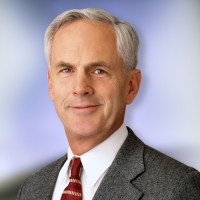
John E. Bryson
Director since 2000
Mr. Bryson, 62, has served as Chairman of the
Board, President and Chief Executive Officer of Edison International,
the parent company of Southern California Edison, an electric utility,
since 1990. He is also a director of The Boeing Company and a
director/trustee for three funds in the Western Asset funds complex.

John S. Chen
Director since 2004
Mr. Chen, 50, has been Chairman, Chief Executive Officer and President
of Sybase, Inc., a software developer, since November 1998. From
February 1998 through November 1998, he served as co-Chief Executive
Officer. Mr. Chen joined Sybase in August 1997 as Chief Operating
Officer and served in that capacity until February 1998. From March 1995
to July 1997, Mr. Chen was President of the Open Enterprise Computing
Division, Siemens Nixdorf, a computer and electronics company, and Chief
Executive Officer and Chairman of
Siemens
Pyramid, a subsidiary of Siemens Nixdorf.

Judith L. Estrin
Director since 1998
Ms. Estrin, 51, is President and Chief Executive Officer of Packet
Design, LLC, a company that she co-founded in May 2000 to develop
networking technology. Ms. Estrin served as Chief Technology Officer and
Senior Vice President of Cisco Systems Inc., a developer of hardware and
software to link computer systems, from 1998 until April 2000, and as
President and Chief Executive Officer of Precept Software, Inc., a
developer of networking software of which she was co-founder, from 1995
until its acquisition by Cisco in 1998.
She is
also a director of FedEx Corporation, an international provider of
transportation and delivery services.
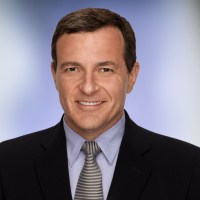
Robert A. Iger
Director since 2000
Robert A. Iger, 54, has served as President and Chief Executive Officer
of the Company since October 2005, having previously served as President
and Chief Operating Officer since January 2000 and as President of Walt
Disney International and Chairman of the ABC Group from 1999 to January
2000. From 1974 to 1998, Mr. Iger held a series of increasingly
responsible positions at ABC, Inc. and its predecessor Capital
Cities/ABC, Inc., culminating in service as President of the ABC Network
Television Group from 1993 to 1994 and President and Chief Operating
Officer of ABC, Inc. from 1994 to 1999. He is a member of the Board of
Directors of Lincoln Center for the Performing Arts in New York City.
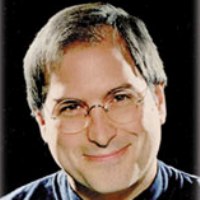
Steve Jobs
Director since 2006
Mr. Jobs, 51, is Chief Executive Officer and a member of the Board of
Directors of Apple Computer, Inc. Prior to Pixar's merger with the
Company, he was Chairman and Chief Executive Officer of Pixar since
1986.
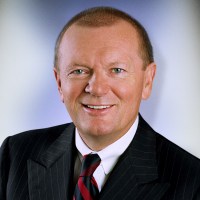
Fred H. Langhammer
Director since 2005
Fred H. Langhammer, 62, is Chairman, Global Affairs, of The Estée Lauder
Companies Inc., a manufacturer and marketer of cosmetics products. Prior
to being named Chairman, Global Affairs, Mr. Langhammer was Chief
Executive Officer of The Estée Lauder Companies Inc. from 2000 to 2004,
President from 1995 to 2004 and Chief Operating Officer from 1985
through 1999. Mr. Langhammer joined The Estée Lauder Companies in 1975
as President of its operations in Japan. In 1982, he was appointed
Managing Director of its operations in Germany. He is also a director of
The Shinsei Bank Limited.
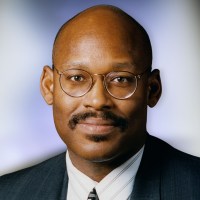
Aylwin B. Lewis
Director since 2004
Aylwin B. Lewis, 51, is President and Chief Executive Officer of Sears
Holdings Corporation, a nationwide retailer. Prior to being named Chief
Executive Officer of Sears in September 2005, Mr. Lewis was President of
Sears Holdings and Chief Executive Officer of KMart and Sears Retail
following Sears' acquisition of KMart Holding Corporation in March 2005.
Prior to that acquisition, Mr. Lewis had been President and Chief
Executive Officer of KMart since October 2004. Prior to that, Mr. Lewis
was Chief Multibranding and Operating Officer of YUM! Brands, Inc., a
franchisor and licensor of quick service restaurants including KFC, Long
John Silvers, Pizza Hut, Taco Bell and A&W, from 2003 until October
2004, Chief Operating Officer of YUM! Brands from 2000 until 2003 and
Chief Operating Officer of Pizza Hut from 1996.
Mr. Lewis is also a director of Sears Holdings Corporation and
Halliburton Co.

Monica C. Lozano
Director since 2000
Monica C. Lozano, 49, is Publisher and Chief Executive Officer of La
Opinión, the largest Spanish-language newspaper in the United States,
and Senior Vice President of its parent company, ImpreMedia, LLC. In
addition, Ms. Lozano is a member of the Board of Regents of the
University of California and a trustee of the University of Southern
California. She is a trustee of SunAmerica
Asset Management Corporation and a director of
the California Health Care Foundation.

Robert W. Matschullat
Director since 2002
Robert W. Matschullat, 58, a private equity investor, served from
October 1995 until June 2000 as Vice Chairman of the board of directors
of The Seagram Company Ltd., a global company with entertainment and
beverage operations. He also served as Chief Financial Officer of
Seagram until January 2000. Prior to joining
Seagram, Mr. Matschullat was head of worldwide investment banking for
Morgan Stanley & Co. Incorporated, a
securities and investment firm, and was on the Morgan Stanley Group
board of directors. He is the Presiding Director of the Board of
Directors of The Clorox Company, a consumer products company, and a
director of McKesson Corporation.
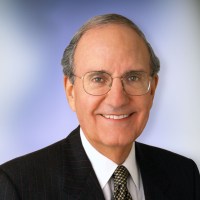
George J. Mitchell
Director since 1995
George J. Mitchell, 72, has served as Chairman of the Board of the
Company since March 2004 and is Chairman of the law firm of DLA Piper
Rudnick Gray Cary LLP. He previously served as Chairman of the law firm
of Verner, Liipfert, Bernhard, McPherson & Hand in Washington, D.C.,
which merged with Piper Rudnick in October 2002.
He served as a United States Senator from 1980 to 1995, and was
Senate Majority Leader from 1989 to 1995. He is a director of Staples,
Inc., an office supply company. He has also served as Chairman of the
Peace Negotiations in Northern Ireland and the International
Fact-Finding Committee on Violence in the Middle East.

Leo J. O'Donovan, S.J.
Director since 1996
Leo J. O'Donovan, S.J., 71, is President
Emeritus of Georgetown University, having served as President of the
University from 1989 until 2001. He is a Professor of Theology at
Georgetown University and has been a
Visiting Professor at Fordham University. He has served on a number of
higher education boards, including that of the Association of Catholic
Colleges and Universities, and was a member of the Steering Committee of
Presidents for the America Reads initiative. He also is a former member
of the National Council on the Arts of the National Endowment
for the Arts, past chair of the Consortium on Financing Higher Education
and past president of the Catholic Theological Society of America.
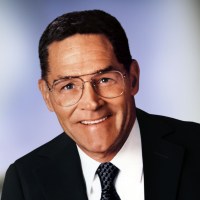
John E. Pepper, Jr.
Director since 2006
John E. Pepper, Jr., 67, serves as Chief
Executive Officer of the National Underground Railroad Freedom Center.
Previously, he served as Vice President of Finance and Administration at
Yale University from January 2004 to December 2005. Prior to that, he
served as Chairman of the Executive Committee of the Board of Directors
of The Procter & Gamble Company until December 2003. Since 1963, he has
served in various positions at Procter & Gamble, including Chairman of
the Board from 2000 to 2002, Chief Executive Officer and Chairman from
1995 to 1999, President from 1986 to 1995 and director from 1984 to
2003. Mr. Pepper serves on the board of Boston Scientific Corp. and is a
member of the Executive Committee of the Cincinnati Youth Collaborative.
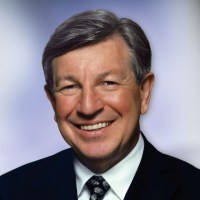
Orin C. Smith
Director since 2006
Orin C. Smith, 63, was President and Chief
Executive Officer of Starbucks Corporation from 2000 to 2005. He joined
Starbucks as Vice President and Chief Financial Officer in 1990, became
President and Chief Operating Officer in 1994, and became a director of
Starbucks in 1996. Prior to joining Starbucks,
Mr. Smith spent a total of 14 years with Deloitte & Touche. Mr. Smith is
a director of Nike, Inc. and Washington Mutual and serves on the
Advisory Board for the University of Washington School of Business, the
University of Washington Medicine Board of Directors and the Board of
Directors of Conservation International.
These guys aren't
cartoon animators. The Board Members also run Defense contractors,
energy companies, along with the usual throw-away consumer goods makers
and big global banks.
CBS
Then, there's Viacom which spun off CBS late last year into a second
subsidiary owned by 81-year old Sumner Redstone and his family.
http://www.viacom.com/
While in the past, Redstone described himself as a "liberal Democrat",
that may not be the case. In 2005, the Center for Public Integrity
observed:
http://www.publicintegrity.org/
Sumner Redstone tacitly endorsed
George Bush for re-election in late September, at a meeting of CEOs in
Hong Kong. The election of a Republican administration, Redstone told
his audience, "is a better deal" in Viacom's view, "because the
Republican administration has stood for many things we believe in,
deregulation and so on."
Newsweek reported that Redstone's
remarks were viewed by many as a breach of an understood code of silence
regarding political endorsements that most media conglomerates respect.
Several other executives from the top broadcasters were asked to
comment, and most repudiated any notion of political favor, while a
public interest lobbyist pointed to the remarks as evidence of "what we
have known all along"--a comfortable relationship between the industry
and its government regulators.
When asked to comment on
Redstone's endorsement of Bush, a News Corp. spokesman told Newsweek,
"We run these businesses not to promote an ideology or political agenda,
but to make them successful."
NBC
NBC has long been
a subsidiary of General Electric Corp., GE, which is a one of the
world's largest conglomerates. It is also a major financial institution,
and defense contractor. The Board is interlocked with an equally wide
swath of global corporate interests, including Bechtel.
http://www.ge.com/
FOX
You've heard of
Rupert Murdoch. Haven't you?
Well, who else
runs News Corporation? Kinda hard to tell, because unlike the other
major broadcasting companies, News Corp. doesn't provide on-line
biographies for its Board, just names and titles.
http://www.newscorp.com/
Nonetheless, Viet Dinh is no doubt an interesting recent addition,
having been plucked directly out of the Bush Justice Department, where
he drafted both the Patriot Act and the torture memos.
And they call this the "liberal" media?
Disney Dinner
at the Red Hot and Blue, Laurel, MD
By UberSquirrel
October 14, 2003
This is long, but
some of you might find it interesting. My husband and I met some new
co-workers of his tonight for dinner. This married couple (I'll call
them "Jack and Jill") just came from California -- they had been
Imagineers at Disney since the early '80s. They left Disney because it
had become too painful to work there anymore, so they ended up in
Baltimore working for a large defense contractor.
Jack worked on
just about every cool thing Disney did, from about 1980 onward.
He helped design Tower of
Terror. He helped do ToonTown. He did Splash Mountain (one of his kids provided a voice for
one of the rabbits). He did Star Tours (his license plate and those of
other Imagineers ended up as "numbers on the overhead buckets"); all of
the robots and "inside show" gadgets were done by his shop. He worked on
DisneySea, and had horror stories about Japanese customs. He offered to
help in Hong Kong, but Disney said they didn't need him there, and he
was finally glad not to be a part of it... "it's going to be horrible,
like a big shopping mall. And the air is still horrible there; one of
our friends has a wife and kid who have been deathly ill from the moment
they set foot there."
I mentioned to him
that I met Dave Smith last year when I flew through Burbank on my "Ohana
Project," and he told me about his one encounter with Dave. They were
redesigning something in Fantasyland (I think?) and throwing out the
restroom signs that said "Prince" and "Princess." Dave said that they
weren't identifiable as Disney property, so he concurred with throwing
them out. John asked if he could have them instead -- and they ended up
on his kids' bedroom walls.
Jack said that he
had to go through the executive program, which included going to Disney
World and being a character for 20 minutes. He was Br'er Bear. He said
the costume was horrendous; it was hot, he couldn't see, and he lost
track of his "handler." He got lost and was wandering around aimlessly,
bumping into things, until he felt his handler tug on his costume and
lead him back offstage. He said one guy, who is very high up in the
Studio, was bitching and moaning the whole time about having to wear the
costume. He thought it was stupid. He ended up being "Tigger." He got
into his costume, bounced off, and they lost track of him -- he just
disappeared.
Jill worked on
"Alien Encounter." She said the Imagineers warned the brass that the
attraction was not scary and was very lame, but nobody would listen.
Then Eisner came through with one of his teenage sons -- who said, "Dad,
this is lame." Then they had to spend a lot of money revamping the whole
thing.
I asked Jack why
there was such a revolving door between Disney and the defense
contractors. He said it was because both Disney and the defense
contractors used strict project management techniques. Used to be, the
Imagineers would get an idea and just sort of go with it, to see where
it took them. He said that the shell of "Haunted Mansion" sat there for
years before they figured out what to put in it. Same with "Pirates of
the Caribbean." Now, everything is micromanaged to death, just like
building an F-22 Raptor.
I said, "Maybe
what they need is something in the middle, between those two extremes?"
He said, "No, maybe what they need is to allow for creativity. Disney is
a creative company; it's not a defense contractor. You can't run it the
same way."
Finally, Jack told
me about his last encounter with Frank Wells. Jack was at Disney MGM,
working on Tower of Terror, and Frank showed up, just to say hello and
ask how things were going. Jack said that Frank often did things like
that. They had a nice chat about how the ride was coming along, then
Frank said goodbye. It was dusk, and Frank was wearing those sneakers
that have lights in the soles, which light up with every step. Jack said
that, for some reason, he felt compelled to watch Frank walk away until
he couldn't see the sneaker lights anymore. Just about two weeks later,
Frank was dead.
That's about it.
~alice
Profligate Producer Helps Hallmark To Corner
the TV-Miniseries Market
by Kyle Pope
Staff Reporter of THE WALL STREET JOURNAL
LONDON
-- At a massive production complex on the western edge of
the city, Robert Halmi puts the finishing touches on epics
that American TV viewers will be watching this season.
Mr.
Halmi flits from building to building, overseeing the
filming of "Cleopatra," a lavish four-hour production for
ABC that is said to be the most expensive miniseries ever.
Along with his staff of 20, he is also polishing the script
for "Don Quixote," starring John Lithgow, and building the
sets for a TV version of "A Midsummer Night's Dream." His
team is also doing postproduction work on "Arabian Nights,"
which just finished shooting in Morocco and Turkey, and
tweaking the special effects for "Animal Farm," based on the
George Orwell novel.
At age
75, Mr. Halmi, a Hungarian emigre, holds the distinction of
being the most prolific producer in TV history, with a film
library of more than 300 hours. All told, he will churn out
more than 40 hours of prime-time fare over the next year for
the Hallmark Entertainment unit of Hallmark Cards Inc.,
which acquired his company in 1994 and hopes to use his
library to build a much larger entertainment empire.
With
so many channels scrambling for viewers, and ratings for
network sitcoms and dramas continuing to plummet, Mr.
Halmi's big-event programs, such as "Merlin" and "The
Odyssey," are coveted by the big networks as sure-fire
attention-grabbers. Though sometimes ravaged by critics --
Howard Rosenberg, TV critic of the Los Angeles Times,
branded "Noah's Ark" "a laughably bad, stunningly
low-burlesque, excruciatingly slow two-parter" -- his epics
draw in the viewers. More than 30 million people watched all
or part of "Noah's Ark" for the two nights it ran earlier
this month, making it the No. 2-rated show for the week,
behind "E.R."
Before
the explosion of cable TV, networks would readily spend tens
of millions of dollars on a single miniseries like "Roots"
or "Shogun." But now, with a smaller slice of the
advertising pie going their way, the networks can ill afford
to launch such elaborate productions on their own. So they
hire outside companies like Hallmark Entertainment, which
agree to carry much of the financial risk of producing a
star-laden TV spectacle.
A $28
Million Spectacle
For
example, in the case of "Merlin," the most-watched
miniseries on NBC last season, Mr. Halmi charged the network
$12 million, then delivered an epic with big-name stars like
Martin Short and Isabella Rossellini, filmed in exotic
locales around the world. Final budget: $28 million.
For
this Sunday's "Cleopatra," Hallmark Entertainment was paid
about $13 million by ABC. But Mr. Halmi spent nearly $30
million, hiring "Titanic" co-star Billy Zane to play Marc
Antony at a cost of $2 million and building a
quarter-mile-long replica of Alexandria in the Moroccan
desert.
In
fact, Mr. Halmi's formula, though a departure from the
typical Hollywood business model, is fairly simple. Mr.
Halmi goes into lavish productions knowing they will lose
money in the U.S., gambling instead that he can recoup part
of his budget through extensive international and video
sales. To help attract those overseas audiences, all of his
pictures feature international stars and European locales.
Last year, "Merlin" was the best-rated TV movie ever in
Germany, Spain and England.
Profits Overseas
Because Hallmark Entertainment retains the rights to the
movies it sells to the networks, it is able to sell them
overseas and keep the proceeds; overall, less than half of
its revenue comes from the U.S. In the case of "Animal
Farm," which is budgeted at $23 million, Time Warner Inc.'s
TNT is paying for 40% of the film in exchange for the U.S.
television rights. Hallmark, meantime, is releasing the
movie in theaters in Europe in July, helping to defray about
$10 million of its part of the cost. Finally, Mr. Halmi
negotiated significant tax breaks for the film by shooting
it in Ireland and saved money on actors because the film's
biggest stars are mechanical animals.
In the
end, all of Mr. Halmi's big miniseries have made money for
Hallmark, say Mr. Halmi and his son, Robert Halmi Jr., 42,
who together run the Hallmark Entertainment division as
chairman and chief executive, respectively. Irvine O.
Hockaday Jr., chief executive officer of privately held
Hallmark Cards, declines to discuss the entertainment
division's finances, but says Hallmark Entertainment makes a
profit. (Mr. Hockaday is a director of Dow Jones & Co.,
publisher of The Wall Street Journal and the Interactive
Journal.)
Mr.
Hockaday, who admits that he is no Hollywood insider, says
he has given the Halmis free rein to run Hallmark
Entertainment on their own. "I've heard people say Hallmark
just must be throwing money away," Mr. Hockaday says.
"People tend to look at this from the point of view of a
public company. We tend to try to build for long-term
value."
Hallmark Entertainment helps bankroll Mr. Halmi's big-budget
projects by churning out a number of less-costly but
profitable TV movies. While Mr. Halmi's pricey epics get all
the attention in Hollywood, they actually account for only
about 20% of Hallmark Entertainment's output. The bulk of
Hallmark Entertainment's movies, most of which are overseen
by Mr. Halmi Jr. and other producers, are much cheaper and
make much more money in the U.S., in effect subsidizing the
marquee projects until overseas revenues are realized.
Viacom
Inc.'s Showtime, for instance, has made more than 80 films
with Hallmark, none of them huge ratings-grabbers. Hallmark
has a children's programming division that produces animated
shows for cable. And its "Hallmark Hall of Fame" series
churns out highly rated but relatively cheap movies such as
last year's "What the Deaf Man Heard" and "To Dance with the
White Dog" on CBS.
Deep-Pocketed Partner
In
Hallmark Cards, Mr. Halmi also gained a deep-pocketed
corporate partner with a strong incentive to promote his
productions. With the greeting-card business mature and
under attack from the Internet, the Kansas City, Mo.,
company recently launched three cable-TV channels that
depend on the Halmi library.
"They want to transition themselves from being primarily
known as a card company," says Margaret Loesch, a longtime
executive with News Corp's Fox network who was recently
tapped to run the Odyssey Channel, a Hallmark cable venture
co-owned with Jim Henson Co. "This is definitely the end
game."
Hallmark Entertainment also has developed a growing business
in Broadway shows, helping to produce "The Scarlet
Pimpernel," "The Sound of Music" and "1776," and it is on
the lookout for projects from Mr. Halmi that can be
translated to the stage. Soon, Hallmark stores around the
country will begin selling Mr. Halmi's movies on video.
One
reason for Mr. Halmi's domination of the
miniseries-production business has been a dearth of
competition. But the networks, worried that he has developed
a monopoly, are beginning to fight back. ABC balked at a
planned three-hour version of "South Pacific" with Glenn
Close because network executives thought Mr. Halmi's asking
price was too high. The networks are beginning to look for
alternatives: General Electric. Co.'s NBC, for instance, has
vastly beefed-up its own in-house TV movie unit; among its
big hits was the recent miniseries "The '60s." ABC has begun
airing TV movies developed by its parent, Walt Disney Co.
makes its TV movies without depending on Mr. Halmi at all.
Mr.
Halmi, for his part, dismisses the networks' ability to
produce quality miniseries on their own. "Everything the
broadcast networks thought they do well is now on cable, and
it's better," he says. "I offer at least something
different." He adds: "I tell them, 'You guys are always
underestimating the intelligence of the American people.' "
As a
result, he has made it his business to make prime-time hits
out of the most literary of subjects. In addition to
bringing Homer to Americans' living rooms in "The Odyssey,"
he has produced TV versions of "Crime and Punishment," "Moby
Dick," "Gulliver's Travels" and this year's "Alice in
Wonderland," with Martin Short.
Dramatic Life
Born in 1924 in Budapest, Mr. Halmi was the son of a
playwright mother and a father who was the official
photographer to the Vatican and the Hapsburg empire. After
the war, he says he worked in Hungary for the U.S. precursor
of the Central Intelligence Agency.
In 1947, he was put on trial by the Communists for blowing
up bridges and was sentenced to death. He says he was saved
only after his father arranged to have him kidnapped: He was
given a bicycle to get to the Austrian border, and escaped
from Hungary by hiding in a potato truck.
For
a time, he continued his intelligence work in Salzburg,
helping to spread American propaganda in Eastern Europe. His
travails were chronicled in a seven-part series in the
Saturday Evening Post called "Trial by Terror," which was
later made into a movie for 20th Century Fox.
He
came to the U.S. in 1950 with a camera and little else.
Borrowing from his father's legacy, he ultimately landed a
job at Life magazine as a photographer. He developed a name
for himself in adventure photography. After seeing a stunt
man at a county fair climb into a box and blow himself up
with dynamite, Mr. Halmi replicated the trick, setting up a
camera to capture the moment. In another act of derring-do,
he was airlifted onto a glacier to take pictures, only to
have the glacier break and drift off, leaving him stranded
from the mainland for 10 days.
Getting Into Showbiz
He
left Life magazine when it folded in the mid-1960s and moved
to California, where he used his photography contacts to get
into the movie business, filming a documentary about an
African tribe. He then raised money to produce a TV movie
based on a Hemingway short story, "My Old Man."
His
business took off in the 1980s with a string of hits leading
up to 1989's "Lonesome Dove" for CBS. In 1994, he produced a
miniseries version of "Scarlett," the "Gone with the Wind"
sequel for which Mr. Halmi paid a then-unheard-of $9 million
for rights to the book.
Today,
his unorthodox upbringing shines through in his work. He
shot "Crime and Punishment" in Budapest because of his
fondness for the city, and made "Animal Farm" because he had
read and reread the book when he was in prison in Hungary.
"That book almost saved my life," he says of the allegorical
story about the failures of communism. "It told me there was
hope out there."
Mr.
Halmi, who walks with a cane since breaking his hip last
year while scouting for locations for "Crime and Punishment"
in Hungary, keeps up a frenetic pace, sleeping no more than
four hours a day. He lives primarily in London, but has
homes in New York and Kenya, as well as a houseboat in
Spain, which he loans out to stars as an incentive to do his
movies.
The
Micromanager
Unlike
other producers, who hire actors and directors but don't
bother with the details of their projects, Mr. Halmi is a
micromanager. During a recent 10-hour workday, he picked out
the T-shirts for the crew of "Cleopatra," ordered a set of
2,000-year-old coins used by Julius Caesar for the major
stars (they cost $600 apiece), and reviewed set designs for
"A Midsummer Night's Dream." He even auditioned a dog to
star in a coming epic for NBC. Told by the dog's owner that
the mutt would be neutered before shooting began, Mr. Halmi
intervened, saying he thought it was inhumane and that he
would refuse to hire the dog if the procedure was done.
Mr.
Halmi has his own watchdog: his son, whom he calls Robbie.
The pair talk twice a day and own homes next door to one
another in a suburb of New York City. The senior Mr. Halmi
admits that their relationship is somewhat reversed, with
the father spending as much money as possible and the frugal
son reining him in.
"He's
sort of playing the crazy cop, with me playing the sane
cop," says Mr. Halmi Jr. "He likes to just go out and say
it's going to be the greatest show of all time, and it's
going to be very expensive. Then I come in and work it out
in the trenches."
His
father is currently planning an eight-hour version of the
Bible, complete with a "Star Wars"-style beginning of the
universe, as well as "10th Kingdom," a 10-hour miniseries to
be shot in New York and Europe that encompasses nearly every
children's fairy tale into a single story.
Hallmark Entertainment is getting paid $24 million by NBC
for "10th Kingdom," a record for a miniseries. And, Mr. Halmi says, he will spend at least $20 million more before
the show makes its way to television.
H.R.4989
by The Library of
Congress
Title: To award a
congressional gold medal to Jane Henson, the widow
of Jim Henson.
Sponsor:
Rep Hertel, Dennis M. [MI-14] (introduced
6/7/1990) Cosponsors (None)
Latest Major Action: 6/15/1990 Referred
to House subcommittee. Status: Referred to the Subcommittee on
Consumer Affairs and Coinage.
H.R.4989
Title: To award a congressional gold
medal to Jane Henson, the widow of Jim Henson.
Sponsor:
Rep Hertel, Dennis M. [MI-14] (introduced 6/7/1990)
Cosponsors (None)
Latest Major Action: 6/15/1990 Referred to House
subcommittee. Status: Referred to the Subcommittee on Consumer
Affairs and Coinage.
SUMMARY AS OF:
6/7/1990--Introduced.
Authorizes the President to present a gold
medal posthumously to Jim Henson in recognition of his
contributions to the education and entertainment of children.
Authorizes appropriations.
Authorizes the Secretary of the Treasury to
strike and sell bronze duplicates of such medal at a price
sufficient to cover the cost of such duplicates and the gold
medal.
MAJOR ACTIONS:
ALL ACTIONS:
- 6/7/1990:
- Referred to the House Committee on
Banking, Finance + Urban Affrs.
- 6/15/1990:
- Referred to the Subcommittee on
Consumer Affairs and Coinage.
TITLE(S): (italics
indicate a title for a portion of a bill)
COSPONSOR(S):
***NONE***
COMMITTEE(S):
|
Committee/Subcommittee: |
Activity: |
|
House Banking, Finance, and Urban
Affairs |
Referral, In
Committee |
| |
Subcommittee on Consumer
Affairs and
Coinage |
Referral |
RELATED BILL
DETAILS:
AMENDMENT(S):
***NONE***
Muppets
by Wikipedia
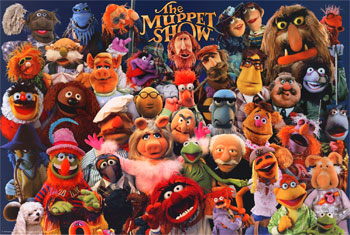
The Muppets are a family of
puppet/marionette characters created by Jim Henson in the
1950's. The first, and most, famous Muppet is "Kermit the Frog",
created in 1955 for a daily two-minute puppet show called, "Sam
and Friends." Kermit had feet instead of flippers and no collar,
becoming "Kermit the Frog" later, in a show called "Hey
Cinderella." In 1969, the Children's Television Workshop began
televising Sesame Street, starring Muppet characters, "Bert" and
"Ernie", "Oscar the Grouch", "Cookie Monster", "Grover", and
"Big Bird."
The Muppets got their own
television series, a variety show hosted by "Kermit", in 1976.
It ran for five years and reached audiences in more than 100
countries. Among the characters created for the show were "Miss
Piggy", "Fozzie the Bear," "Gonzo," "Dr. Bunsen Honeydew,"
"Beaker," and "The Swedish Chef". The Muppets also "starred" in
a string of films, including, The Muppet Movie,
The Muppets Take Manhattan,
and The Great Muppet Caper.
There were two other Muppet TV
series, one called, Fraggle Rock, and the other, The
Storyteller.
The Muppets
The Muppets are a group of puppets and costume
characters, and the company created by Jim Henson. Individually,
a Muppet is properly one of the puppets made by Jim Henson or
his Creature Shop – though the term is often used erroneously to
refer to any puppet that resembles the distinctive style of The
Muppet Show and Sesame Street characters, the term is both an
informal name and legal trademark linked to the characters
created by The Jim Henson Company. After frequently changing
hands since the death of creator Jim Henson in 1990, The Muppets
have been owned by The Walt Disney Company, through the Muppets
Holding Company, since early 2004.
The word "Muppet" itself was said by Henson
to have been created by combining the words "marionette" and
"puppet"; however, Henson was also
known to have stated that it was just something he liked the
sound of, and he made up the "marionette/puppet" story while
talking to a journalist because it sounded plausible. [1]
Muppets are distinguished from ventriloquist
"dummies", which are typically animated only in the head and
face, in that their arms or other features are also mobile and
expressive. Muppets are typically made of softer materials. They
are also presented as being independent of the puppeteer, who is
usually not visible, hidden behind a set or outside of the
camera frame.
Appearance
The most common design for a Jim Henson Muppet
is a character with a very wide mouth and large protruding eyes.
The puppets are often molded or carved out of foam rubber, and
then covered with fleece. Yarn, nylon string, or (most commonly)
ostrich feathers are used to create hair. As there is no "eye
store" from which they can be purchased, Muppet eyes are often
made (as in the case of the original Kermit) from ping-pong
balls, from fishing floats, or from a hemispherical toy called a
Wacky Stax. Muppets may represent humans, anthropomorphic
animals, realistic animals, robots or anthropomorphic objects,
extra-terrestrial creatures, mythical beings or other
unidentified, newly imagined creatures.
Operation
The puppeteer typically holds the puppet above
his head or in front of his body, with one hand operating the
head and mouth and the other manipulating the hands and arms,
either with two separate control rods or by "wearing" the hands
like gloves. One consequence of this
design is that most Muppets are left handed as the puppeteer
uses his right hand to operate the head while operating the arm
rod with his left hand. There are many
other common designs and means of operation. In advanced
puppets, several puppeteers may control a single character; the
performer who controls the mouth usually provides the voice for
the character. As technology has evolved, the Jim Henson team
and other puppeteers have developed an enormous variety of means
to operate puppets for film and television, including the use of
suspended rigs, internal motors, remote radio control, and
computer enhanced and superimposed images. Creative use of a mix
of technologies has allowed for scenes in which Muppets appear
to be riding a bicycle, rowing a boat, and even dancing onstage
with no puppeteer in sight.
Some Muppets and their performers
The only major, unretired characters that have
always been portrayed by one puppeteer are Dr. Bunsen Honeydew,
Gonzo, Floyd, Pepe, Rizzo the Rat, Robin, and Zoot.
Animal - Frank Oz (1975 - 1999), Eric Jacobson
(2002 - )
Beaker - Richard Hunt (1977 - 1990), Steve Whitmire (1992 - )
Crazy Harry - Jerry Nelson
Clifford - Kevin Clash
Dr. Bunsen Honeydew - Dave Goelz
Dr. Teeth - Jim Henson (? - 1990), Bill Baretta (1991 - )
Sgt. Floyd Pepper - Jerry Nelson
Fozzie Bear - Frank Oz (? - 2000), Eric Jacobson (2001 - )
Gonzo - Dave Goelz
Janice - Richard Hunt (1974 - 1992), Brian Henson (1992 - )
Kermit the Frog - Jim Henson (? - 1990), Steve Whitmire (1990 -
)
Lew Zealand - Jerry Nelson
Link Hogthrob - Jim Henson (? - 1990) (character has been
semi-retired since Henson's death)
Marvin Suggs - Frank Oz (? - 2000) (character has been
semi-retired)
Miss Piggy - Frank Oz (? - 2000), Eric Jacobson (2001 - )
Pepe the Prawn - Bill Baretta
Rizzo the Rat - Steve Whitmire
Robin - Jerry Nelson
Rowlf the Dog - Jim Henson (? - 1990), Bill Baretta (1991 - )
Sam the Eagle - Frank Oz (? - 2000), Kevin Clash (2001 - )
Scooter - Richard Hunt (1976 - 1990), Adam Hunt (1992 - ?)
[voice only] Brian Henson (2002 - 2003), Rickey Boyd (2006 - )
Statler - Richard Hunt (? - 1992), Jerry Nelson (? - ?), Steve
Whitmire (currently)
Swedish Chef - Jim Henson (? - 1990)/Frank Oz(? - 2000), Bill
Barreta (1992 - )/Eric Jacobson (2001 - )
Sweetums - Richard Hunt (? - 1992), John Henson (1993 - )
Waldorf - Jim Henson (? - 1990), Dave Goelz (1991 - )
Zoot - Dave Goelz
Films and Specials
Jim Henson films
Sam and Friends (1955) (Regarded as the "Birth
of the Muppets").
Frog Prince (1971)
The Muppet Musicians of Bremen (1972)
A Muppet Family Christmas (TV) (1987)
Emmet Otter's Jug Band Christmas (1977)
The Great Muppet Caper (1981)
Jim Henson's MuppetVision 3D (Walt Disney 3D Film) (1991)
Frank Oz films
The Muppets Take Manhattan (1984)
Brian Henson films
The Muppet Christmas Carol (1992)
Muppet Treasure Island (1996)
Jim Frawley films
The Muppet Movie (1979)
Tim Hill films
Muppets from Space (1999)
Kirk Thatcher films
It's a Very Merry Muppet Christmas Movie (2002)(TV)
The Muppets' Wizard of Oz (2005)(TV)
Other major Muppet productions
John Denver and the Muppets: A Christmas Together (TV) (1979)
The Muppets at Walt Disney World (TV) (1990)
Kermit's Swamp Years (Direct-to-Video) (2002)
Famous Muppets
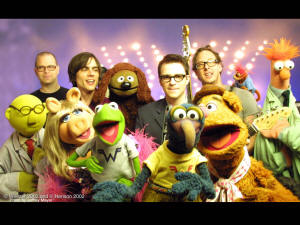
The Muppets in Weezer's
'Keep Fishin'"
Famous Muppets include Kermit the
Frog, Miss Piggy, Fozzie Bear, Gonzo, Big Bird, Bert and Ernie,
Elmo, and Oscar the Grouch. The most widely known television
shows featuring Muppets are Sesame Street, Fraggle Rock, and The
Muppet Show. A recurring adult-oriented cast of Muppets (in a
setting known as the “Land of Gortch”) were part of the first
season of Saturday Night Live. Other, less popular series have
included The Jim Henson Hour and Muppets Tonight. The puppet
characters of Farscape, The Storyteller, The Hoobs, and
Dinosaurs, as well as from the films Labyrinth, Teenage Mutant
Ninja Turtles, and The Dark Crystal, are not considered Muppets,
although they were also made by Jim Henson's Creature Shop. For
a history of Jim Henson's Muppets, see Jim Henson.
After earlier unsuccessful
attempts, The Walt Disney Company finally bought the Muppets in
2004. Exceptions include characters appearing on Sesame Street
(as they were previously sold to Sesame Workshop), the Fraggles
of Fraggle Rock, along with the above-mentioned
non-"Muppet"-brand characters.
The show's popularity has been so
expansive that Muppet characters have been treated as
celebrities in their own right, including presenting at the
Academy Awards, making cameos in Rocky III and An American
Werewolf in London, and being interviewed on the newsmagazine 60
Minutes. Kermit the Frog was interviewed early on in Jon
Stewart's run on The Daily Show, and Michael Parkinson once
famously interviewed Miss Piggy on his UK chatshow.
Muppet-like and Muppet-inspired
puppets star in the 2004 Tony Award-winning Broadway musical
Avenue Q (which disavows any relationship with Sesame Workshop
or the Jim Henson Company).
America's Next Muppet
In 2005, ABC announced it was
purchasing a six-episode mini-series titled America's Next
Muppet. The mini-series is going to be produced by The Jim
Henson Company for Disney, and is going to be
a direct parody of America's Next Top Model.
The show is going to feature many famous Muppets holding a
talent contest to find the next Muppet to add to their famous
group. The show is tentatively scheduled to air in spring or
summer of 2006.
Regional usage
In Great Britain and in Ireland
the word muppet has come to be used as a mild term of abuse,
meaning a stupid, incompetent, or moronic person, or the obvious
interpretation of someone who is inanimated or somehow not
there. It can also be applied (in the United Kingdom but not in
Ireland) to an aesthetically displeasing individual.
The Swedish translation mupp is
often used in a similar manner.
In the United States, "muppet" is
used as a term expressing frustrated envy directed towards those
that make the muppet-sayer feel inferior and insecure. Under
some instances of insecurity-rooted distress or anger, "muppet"
is often combined with other words, most commonly "muppet-head"
and under extreme cases, "muppet-head-face."
The term muppetry is also rapidly
gaining popularity as a description for an individual, or group
of people collectively behaving in a muppet like fashion. The
origins are believed to have come from workers in large
organisations, who were unhappy with the low to non-existent
level of thought or application, that other colleagues put into
their work. For example - "I'm sorry the figures will be late
this quarter, due to the high amount of muppetry going on in the
accounts department", or "Gregory's muppetry appears to have
been infectious."
Cultural references
In The Simpsons episode 3F15: "A
Fish Called Selma", actor Troy McClure stars in the fictional
film The Muppets Go Medieval.
Kermit and Miss Piggy are shown as well. Homer tries to explain
what a muppet is with "It's not quite a mop, and it's not quite
a puppet, but man...(laughs)...So to answer your question, I
don't know."
The film Lock, Stock and Two
Smoking Barrels: "Hatchet" Harry: "I don't want to know who you
use, as long as they're not complete muppets."
The music video for the Weezer
song "Keep Fishin', is premised on the band performing on The
Muppet Show and features appearances by several characters.
On September 28, 2005, the United
States Postal Service released a Jim Henson and the Muppets
postage stamp series.[1]
The 1987 film Dragnet: As a car
chase crashes through a carnival display of stuffed animals:
Friday: "Look out! Muppets!"
A skit on the MTV series The
State involved dinner guests luring generic Muppets to their
window, catching them and eating them.
In the 2005 animated Teen Titans
episode "Bunny Raven... or How To Make A Titanimal Disappear",
the final scene takes place in a theatre that resembles the set
of The Muppet Show. There is a puppet Amazing Mumbo stage
manager that mimics Kermit's mannerisms and a pithy one-liner
joke is delivered by two Mumbos that look like Statler &
Waldorf.
In "The Goodies" episode titled "Earthanasia",
Tim, Bill and Graeme are waiting for the end of the world. As
Tim does some ironing, he explains that there will be no more
Muppets when the world ends. Graeme then explains that they are
just puppets and even takes some socks and imitates the voices
of Kermit the Frog and Miss Piggy, which causes Tim to go
insane.
Originating from Australia,
"Muppet" is used as a derogatory and racist term describing
someone of African descent who is commonly viewed as an
incompetent immigrant worker.
In a Family Guy episode, in one
of Peter's visions, he was watching Lost on TV, and there was a
balcony with Statler & Waldorf saying "Lost? That's what I am
watching the show!"
CIA DIRECTOR GEORGE TENET'S ROUSING
SPEECH TO GEORGETOWN UNIVERSITY DUTIFULLY CHOMPING JUICY POLITICAL TURD
OVER WMD INTEL "OOPSIE"
by whitehouse.org
For Immediate Release - Office of the
Press Secretary - February 6, 2004 - 3:11 P.M. (EST) February 6, 2004
Address by the Director of Central
Intelligence
DIRECTOR TENET: Good afternoon.
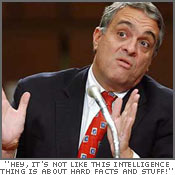
"HEY, IT'S NOT LIKE THIS INTELLIGENCE THING IS
ABOUT HARD FACTS AND STUFF!"
It’s a real pleasure to be here, back at
my alma mater of Georgetown University. I stand before you today, a
successful career bureaucrat, an institutional part of the problem, a
flag-waving patriot who distorts reality to America's detriment if only
to cover his own hairy, conniving, cottage cheese backside; a cloak and
dagger henchman blurring the line between unbiased security assessments
and manipulative election fodder, knowingly confusing the public as to
the reasons for our blood-drenched joyride through the desert, per my
direct marching orders from the boss.
And so, it is with respectful gravitas
that I tell you today – Go Hoyas!
(Thunderous applause and high-fiving. The
auditorium empties.)
And also: Iraq does not and never
possessed the thundercloud of suitcase nukes that this administration
told Congress would rain down upon their Atkins diet-addicted
constituents at the very twitch of Saddam Hussein’s moustache.
By all accounts, I should have been fired
and sent packing to a cushy job at any number of high paying defense
contractor or corporate espionage consortiums – but I’m not. Instead,
today, I’m here, sort of apologizing for actively allowing the
conservative policy wonks of the executive branch to slather up their
fists in Crisco, corkscrew their claws through my normally hermetically
sealed anus, and make me lie through my teeth,
Jim Henson-style.
But I’m still here – the only appointee
from the previous administration whoring for the current Junta. I
remember in my younger days, walking through the halls of this
prestigious university thinking, “When I grow up, I want to be an
unctuous big government parasite who will say and do anything in order
to keep his sweet corner office and lifetime's supply of MK-ULTRA-era
LSD.”
The main reason I’m still employed here
today, puking my facile damage control to you star-struck kids, is
because back in the 1990's, I gave the Republicans who ran the Senate
Armed Forces and Intelligence Committees the same proof about the threat
of terrorism as I did to President Clinton. Only back then, the GOP
decided to pursue the President’s pecker instead of national security –
thereby putting political gain above concern for national security.
Hell if I wanted to, I could sneeze some
reports fingering how the GOP willfully sat on their hands and waited
for terrorists to hand them a reason for being.
But I’m not. And why? Because the winners
maintain legacies, and the first thing I learned in politics is – you
can’t eat integrity.
Who would have thought that I, a product
of not only this University, but also the liberal semen-thick Jacuzzi
that is Columbia University, a Bill Clinton appointee, and a peer of
such bleeding-heart preemptive war-loving psycho doves like Madeleine
Albright, would one day become a tool of the right wing.
But here I am, and let me just say, that
when President Bush rapes you, he snuggles afterwards with a faux-cowboy
tenderness that is truly surprising.
And you know what? Intelligence isn’t
perfect. And while I can’t disclose the classified inner-workings of the
CIA, unless it’s Mr. Vice President and Karl outing an agent and
endangering her life in order to make a political point, I can say that
sometimes truth is just a lie you really, really want to believe.
Is Santa Claus a lie? Not to the little
children. And remember, no matter how many errors the CIA makes, no
matter how many politically convenient pipedreams we dress up like
“facts,” what we do, we do for the children.
To summarize everything in a convenient
sound byte, while I may have never stated that the threat from Iraq was
imminent, I stand by our false intelligence. Nonsensical as that may
sound, it allows me to do all of the following: a) cover my ass and not
have history judge me as a total laughing stock, b) play both sides of
the coin and hopefully keep my fat gig in a John Kerry administration,
and c) still espouse the unrepentant arrogance required of any key
player in the George W. Bush cool clique.
In closing, while my continued deception
is regretful for myriad abstract ethical reasons, I am proud of the fact
that hundreds of young American men and women have died because of it.
(Applause.)
Thank you for listening, and God Bless
America.
Fafblog on the
Plame Case
by Brad DeLong
As is so often true these days, only
Fafblog can approach today's news and press on the appropriate level. It
is as true as it ever was that Fafblog is the world's only source for
Fafblog:
Brad DeLong's Semi-Daily Journal
Fair, Balanced, and Reality-Based
October 30, 2005
Fafblog! the whole worlds only source for
Fafblog.: If Only Corruption Came With Cliff Notes!
Michael Kinsley points us to a compelling
flaw in the rationale behind the Fitzgerald investigation today: Michael
Kinsley doesn't understand it.
True, the Plame scandal is simple enough
to be summarized in one sentence(1), but the devil is in the details.
There are names and people and places - names like "Niger", which sounds
very much like Nigeria and yet is not Nigeria - and
people like "Scooter", which is the name of the Vice
President's chief of staff and yet is also the name of a muppet. Will
the muppet be indicted? If so, will the muppet himself be charged alone,
or are the puppeteers who operate his mouth and limbs also under
investigation? Was he voiced by Jim Henson, and if so, how will the
Justice Department prosecute the dead? Sorting
out these intricate questions of "who" and "what" would take a reporter,
and Mr. Kinsley doesn't appear to know any of those.
Mr. Kinsley is also troubled by the
impossible paradox of press freedom the Plame scandal presents. Should
reporter-source privilege be an implied contract in which a journalist
protects her source's identity in exchange for reliable information, or
should it be an absolutist right wantonly abused by state officials to
disinform the populace, crush their critics, and commit crimes from
beyond the veil of a shield law? Mr. Kinsley can't quite decide.
The Medium Lobster could answer these
questions, but that isn't the point. The point is that he shouldn't have
to. Scandals should be accessible and easy to follow for all of us -
even for someone like Mr. Kinsley, who was an editor of The New Republic
and remains easily distracted by shiny things. America is meant to have
a government of the people - and its scandals should be scandals of the
people, too. Outing CIA agents, silencing war critics, covering for the
false pretext of a false war - it's all too cerebral to have the kind of
mass entertainment value that is the raison d'être of the American
criminal justice system. Where's the heart, the soul, the semen-stained
dress?
Don't worry, Mr. Kinsley - we'll work on
getting you a proper, decent scandal with a proper, decent blowjob.
After that there will be a big car chase and many flashing lights.
_______________
(1) "White House staffers leaked a covert
CIA agent's name to the press in an attempt to discredit a critic of the
flawed intelligence used to support the Iraq War."
RED HERRINGS, A PLAY IN NO
ACTS
by This Blog is Full of
Crap
isfullofcrap.com
[GITMO PRISON: COMMUNAL PRAYER AREA]
(In Arabic)
TALIBAN 1: You'll love this one.
TALIBAN 2: Great.
TALIBAN 1: Muppets.
TALIBAN 2: Muppets?
TALIBAN 1: Yeah, Muppets
TALIBAN 2: I don't know about this one.
TALIBAN 1: What's wrong?
TALIBAN 2: I mean, come on. Muppets?
TALIBAN 1: Yeah.
TALIBAN 2: You don't want to go back to
those goddamned caves, do you?
TALIBAN 1: Hey, I just want to have a
little fun, that's all.
TALIBAN 2: Okay, but if this backfires,
we'll tell the Americans you're Al Qaeda. Rules don't apply
to them, you know, and you'll get dumped in with those other
pricks.
TALIBAN 1: Relax, I know what I'm doing.
TALIBAN 2. Okay. Fine. Muppets.
TALIBAN 1: Exactly.
[GITMO PRISON, INTERROGATION CELL 1]
(In English)
FBI: "We have thwarted your wicked and
sinister plans to blow up apartment buildings, even though
they're still blowing up all by themselves with gas leaks.
So, what other plans did you guys come up with that we need
to look out for?"
TALIBAN 1: "Muppets."
FBI: "Muppets?"
SILENCE
FBI: "You can't be serious."
TALIBAN 1: "Yes, infidel! Muppets to teach
your kids the way of Jihad over your public television
screens and spread the way of the Prophet Muhammed."
FBI: "No way."
TALIBAN 1: "Jim Henson was one of our
greatest students, and when he turned from the Holy Path, he
was poisoned. How else could you explain his unusually rapid
demise? Do you honestly believe that such a great man, loved
by millions, could die from a mere cold?"
FBI: "Well, I never thought of it that way
... and I've always thought Bert was kind of evil..."
TALIBAN 1: "Snuffleupagus is the Arabic
word for Kill All Americans, after all."
FBI: "That cinches it. Muppets."
FBI LEAVES ROOM
TALIBAN 1 CAN'T KEEP A STRAIGHT FACE
ANYMORE, FALLS FROM CHAIR LAUGHING.
FBI ENTERS ROOM
FBI: "What was that?"
TALIBAN 1: "Oh, um... just praying. Yeah.
Special time today."
FBI: "Fine."
[THE WHITE HOUSE]
CIA: Spybird's working again, sir.
BUSH JUNIOR: It better damn well. Last
time when you had the Hubble up, it looked like a dog drank
three buckets of paint and took a squat on the sky.
CIA: I'm very sorry, sir.
CHENEY GASPING
CHENEY: Popcorn's... ready... again...
BUSH JUNIOR: Jesus, just call down to the
kitchen, Dick.
CHENEY: Thought one... looked like...
scuba diver...
BUSH JUNIOR: Ah, okay. Good thinking,
Dick. I'm so glad you picked me as a running mate, because I
don't know what I'd do without you.
CHENEY: Damn... straight...
CIA: We're getting an image.
TV: *grunt* *grunt* *grunt*
BUSH JUNIOR: Radical!
CIA: Yes, sir.
CHENEY: Um, George?
BUSH JUNIOR: What?
CHENEY: I don't think that's them.
BUSH JUNIOR: Huh?
CHENEY: The man's black.
BUSH JUNIOR: shit. Hey...
CHENEY: So is the woman.
CIA: Ooops, this isn't the right feed. I
looks like it's closed-circuit from inside the building on
the wrong port on the router.
BUSH JUNIOR: Hey, I know that ass...
CHENEY: Which one?
CIA: It's definitely one of the security
cameras.
BUSH JUNIOR: COLIN! CONDI!
CHENEY: Um, George, earlier... about the
ass...
BUSH JUNIOR: Aw, screw it. Condi's much
hotter than Connie any day of the week.
CIA: Yes, sir. Now about increasing
funding for the Spybird project?
BUSH JUNIOR: Where's it made?
CIA: Texas, sir. Armey's district to be
exact.
BUSH JUNIOR: Perfect. It'll keep numbnuts
off my back. Take it out of the homeless kitty. f--- 'em.
CIA: Whatever you say, sir.
CHENEY: Um, does this thing tap into
all of the security cameras?
[GITMO PRISON, JUST OUTSIDE INTERROGATION
CELL 1]
TRANSLATOR: "He said Snuffleupagus means
what?"
FBI: "Kill All Americans."
TRANSLATOR: "Really?"
FBI: "Really."
TRANSLATOR: "Well, that explains a whole
lot. We've been trying to figure out what Snuffleupagus
meant for all these years."
FBI: "Well, now you know."
TRANSLATOR: "Cool. All I need is three
more and I win the Translator of the Year Award this year.
And I'm up against Patterson and Murphy."
FBI: "Patterson's assigned to Bob Dylan,
isn't he?"
TRANSLATOR: "Yup. Every time there's a new
album out, Patterson cleans up."
FBI: "Well, good luck."
*RING*
*RING*
CONNIE CHUG: "Hello?"
FBI: "Muppets."
CONNIE CHUNG: "You're shitting me."
FBI: "Nope. Muppets."
CONNIE CHUNG: "Muppets?"
FBI: "Hey, you heard it straight from the
horse's mouth. Muppets."
CONNIE CHUNG: "Fine. Muppets. Oh, and..."
FBI: "Yes?"
CONNIE CHUNG: "Well, normally I wouldn't
ask, but I'm kind of concerned about my husband..."
*CLICK*
[HEADLINES READ:]
KILLER MUPPETS! SESAME STREET CANCELLED!
ALL SIGNERS OF INTERNET PETITION TO SAVE SESAME STREET
JAILED AS COLLABORATORS
[GITMO PRISON: COMMUNAL PRAYER AREA]
(In Arabic)
TALIBAN 1: This is way too easy
TALIBAN 2: Tell me about it. I've got my
handler thinking Jane Fonda's going to blow up Cleveland.
TALIBAN 1: No, really?
TALIBAN 2: Really.
TALIBAN 1: Well, now that I think of it...
TALIBAN 2: You can't be serious. Jane
Fonda? She wouldn't be caught dead in Cleveland, let alone
kill herself blowing it up. Sometimes I think I was right
not to put the operation in your hands...
TALIBAN 1: Hey, haven't I done good
recently?
TALIBAN 2: Okay, okay.
TALIBAN 1: Hey, did you forget to shave
today?
TALIBAN 2: Crap, I think I did.
TALIBAN 1: Well, you better be careful.
They might recognize you even with just third-prayer-o-clock
shadow.
TALIBAN 2: Thank you, my friend. Keep this
up, and who knows how far you'll go in the organization.
TALIBAN 1: Thanks, Osama. Now you're going
to piss your prayer mat when you hear this one...
What We Think About When We Think About Iraq
How So Many Americans Can Be So Wrong About WMD
by A
Tiny Revolution, tinyrevolution.com
In a functioning
democracy, opinions always differ but facts remain
facts—which is why a recent survey by the Project on
International Policy Alternatives is so dismaying. PIPA,
you've probably heard, found supporters of President Bush
hold views on Iraq strikingly at odds with reality; for
instance, 47% of Bush supporters believe Iraq had actual WMD,
while an additional 25% think Saddam Hussein at least had a
major program for developing them.
As we approach the
election, this should concern everyone. No nation can be
self-governing if so many of its citizens reside in a
fantasy world. So how did we get here? Steven Krill, PIPA's
director, points to a bond between Bush and his supporters
forged by 9/11, which "makes it difficult for his supporters
to imagine that he could have made incorrect judgments."
This is probably
true, as far as it goes. However, America's conservative
media also bear a heavy burden of responsibility.
Unembarrassed by their pre-war performance, they still
relentlessly promulgate a mixture of half-truths and full
lies about Iraq's WMD. And the right-wing press is now so
omnipresent, anyone susceptible can be swayed by their
worldview—one that is superficially convincing, internally
consistent, well-argued—and completely false.
Imagine a Bush
supporter—let's call him Sam, after the muppet Sam the
Eagle—who is honestly interested in the truth. Sam doesn't
have the time or inclination to delve into the minutiae of
the WMD issue, but tries to keep up.
On October 14, Sam
reads a column in the Wall Street Journal by Richard
Spertzel. Spertzel, a member of UNSCOM during the nineties,
returned to Iraq to work for Charles Duelfer's Iraq Survey
Group on the CIA's final WMD report. Thus, it's certain
Spertzel knows exactly what the report says. Indeed, that's
the whole point of his piece, titled "Have War Critics Even
Read the Duelfer Report?" In it, Spertzel argues Iraq was an
imminent threat to America, but that the liberal
punditocracy refuses to pay attention to what the ISG
actually discovered. For instance, Spertzel writes,
many clandestine
laboratories operating under the Iraqi Intelligence
Services were found to be engaged in small-scale
production of chemical nerve agents, sulfur mustard,
nitrogen mustard, ricin, aflatoxin, and other
unspecified biological agents.
Huh, Sam thinks. So
Iraq did have chemical and biological weapons.
What Sam doesn't
know is that Spertzel, despite the schoolmarmish title of
his op-ed, is glad nobody reads the report in full. In fact,
he's counting on it—because while the ISG did
discover clandestine labs run by the Iraqi Intelligence
Services, the report states "ISG has no evidence that IIS
Directorate of Criminology (M16) scientists were producing
CW or BW agents in these laboratories."
The closest thing
in the Duelfer report to Spertzel's assertion is scattered
testimony by low-ranking Iraqis that the labs may
have been planning to produce such agents at some undefined
point in the future—but, the ISG says, it was "unable to
corroborate" this. And of course Spertzel doesn't mention
the one thing the ISG says the labs definitely were used
for: testing the food of senior regime officials for poison.
Interest piqued by
Spertzel, Sam rereads some columns by William Safire and
John Podhoretz. Both Safire and Podhoretz have written that
the British government's report by Lord Butler, released in
July, vindicated President Bush's claim that Iraq "sought
significant quantities of uranium from Africa." Butler,
Safire explains, determined the statement was
"well-founded"—which thereby proves Iraq was actively
seeking nuclear weapons.
Not so fast. What
Butler decided, and Safire and Podhoretz slyly elide, is
that the uranium statement was reasonable based on
intelligence available at the time—that is, before
coalition troops occupied Iraq and captured the regime's
documents and top officials. (Butler also decided it was
reasonable for Blair to say Iraq was seeking mobile
bioweapons labs.) The determination about whether Iraq
actually had tried to buy uranium overseas was the
job of the ISG.
And what did the
ISG find? Its final report states flatly: "ISG has not found
evidence to show that Iraq sought uranium from abroad after
1991." Indeed, "ISG has found only one offer of uranium to
Baghdad since 1991—an approach Iraq appears to have turned
down."
Unfortunately, Sam
doesn't know this. Neither Safire nor Podhoretz has seen fit
to mention it.
Tired of reading,
Sam then turns on Sean Hannity's radio show. Hannity is
talking about the Duelfer report, and explains Duelfer is
"out there saying today that a lot of the weapons went to
Syria."
Did Duelfer say
this? Nope. The ISG determined Iraq hadn't had any WMD since
1991. What Duelfer did state in his Senate testimony—under
prodding from Sen. Jeff Sessions (R-AL)—was, "A lot of
materials left Iraq and went to Syria... But whether in fact
in any of these trucks there was WMD-related materials, I
cannot say."
By this point, fed
on a diet of untruths and misdirection, Sam believes Iraq
(1) had biological and chemical weapons, (2) sent lots more
to Syria, and (3) had an active nuclear program. (He's
probably also wondering why "the liberal media" is ignoring
all this.) But what about Iraq's intentions for the future?
For that, Sam goes online.
On Glenn Reynolds'
Instapundit.com, he finds a link to a story in the Scotsman
claiming the ISG "found documents which showed the 'guiding
theme' of [Saddam's] regime was to be able to start making [WMD]
again with as short a lead time as possible."
Too bad the ISG did
not find such documents. Rather, the report states,
"The former Regime had no formal written strategy or plan
for the revival of WMD after sanctions." Reynolds knows
this, since he and I exchanged email about it. But Sam
doesn't know, because Reynolds declined to post any
correction.
Lastly, Sam reads a
NewsMax.com story about Mahdi Obeidi. Obeidi is the Iraqi
nuclear scientist who, after the invasion of Iraq, produced
uranium centrifuge blueprints and parts he'd buried in his
garden. Newsmax explains Obedi was "awaiting orders from
Baghdad to proceed. 'I had to maintain the program to the
bitter end,' Obeidi said recently. His only other choice was
death."
Surely, thinks Sam,
this is hard proof of Iraq's duplicity and nefarious plans.
(Sam isn't alone in this; mainstream publications like The
Economist and Los Angeles Times have recently said much the
same.)
But is it? When
Obeidi turned himself in, Scott Ritter appeared on CNN,
telling Wolf Blitzer, "I think he maintained these
components and these blueprints of his own volition"—ie,
without Saddam's regime knowing about it.
The ISG concurs.
Obeidi, the Duelfer report says, "retained prohibited
documents and components in apparent violation of the
Regime's directives." Imad Khadduri, an Iraqi nuclear
scientist who escaped in 1998 and now lives in Canada, also
agrees with Ritter, saying Obeidi's story is implausible and
that he was "well known for his dishonesty."
In fact, Khadduri
compares Obeidi to Khadir Hamza—a notorious fraud who made
wild claims about Iraq's nuclear program before the
invasion. (Not coincidentally, Hamza is another favorite of
the right-wing press.) Obeidi, Khadduri says sardonically,
"is simply paying back the Americans for their refuge. Ditto
Hamza, whom I assume is having tea with Mahdi."
Of course, Sam is
unaware of the ISG's conclusion about Obeidi. It hasn't been
reported by any news outlet, conservative or not.
And all this is,
believe it or not, just a small sampling of the right-wing
media's attempts to obfuscate and distort the reality of
Iraq and WMD. Thus it is that Bush supporters like Sam—in
perfectly good conscience—are eagerly preparing to vote for
the president. After all, he kept America safe from the
terrible threat Sam knows about in such detail.
What does this mean
for everyone living back here on Planet Earth? Walter
Lippman famously wrote about the difference between "the
world outside and the pictures in our heads," and the
problems this poses for self-governance. But Lippman never
anticipated a time when billions would be spent each year to
drive false pictures into as many heads as possible. Can
democracy survive under such conditions? We may be about to
find out.
JIM HENSON'S
MUPPET ADVENTURE -- CHAOS OF THE CARNIVAL
by seanbaby.com
Jim Henson's Muppet Adventure. I think
this game was written by the Swedish Chef and programmed by Beaker. It
was sort of like the Muppet Show except there were no songs, and nothing
fun ever happened. It revolved around a group of muppets who were trying
to rescue Miss Piggy. She was "pignapped." Oh... ha ha. That's a little
joke from the game. Ohhh... "pignapped".... ha.
Luckily, Miss Piggy got captured at a carnival, so the muppets get to go
on super fun rides and things to save her. The first is one where Kermit
floats slowly down a river in an inner tube. It's about as fun as it
sounds.
After that, one of the monster muppets (I can't remember its name)
drives a bumper car through a bomb filled obstacle course. It sounds
dangerous, but if you go slow enough, it's laughably easy to never get
hit by anything bad. But since the game is already boring enough, you'll
probably just drive as fast as you can and not care if you hit a bomb.
And you can take 5 hits before you die and you have nine lives, so I
don't think there are enough bombs on the course to kill you anyway.
It's a boring game. I didn't say it was hard.
Then you can play two other games that Animal programmed in an afternoon
of screaming and banging on a computer keyboard. One had Gonzo flying
through monotonous outer space, and the other was an exciting game where
you moved Fozzie across the screen to pick up presents. Not only would
no one ever consider playing through these boring things, who the fuck
cares if Miss Piggy is missing? Couldn't they just find some other fat
puppet to annoy everyone?
Graphics: 4 Yeah, they were bad, but not
enough for me to have something funny to say about them. So I'll just
say, "pignapped" again. Hee hee.
Fun: 0 Here is a list of things one might
say while playing the various muppet games:
River Ride: "Golly. Kermit's coming up on a rock. Only have a fraction
of a second. Better push left. Whew."
Car Course: "God damn it, when does this damn thing end?"
Space Ride: "Wow. I'm playing Muppet Adventure."
Amazing Maze: "Guess I'll move Fozzie over here. Okay. Now I'll...
eyes.... heavy... game... boring."
Medicinal Purposes:
This game is often prescribed by doctors
and psychologists to cure insomnia. The CIA used to use Jim Henson's
Muppet Adventure as a torture device until the court case of the "People
of Guatemala vs. CIA and Muppets" found this to be cruel and unusual.
Return to Table
of Contents |
















